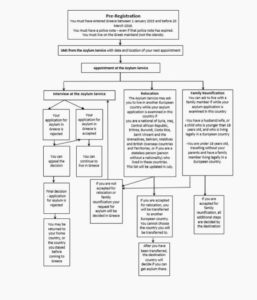Bureaucracy the latest barrier for asylum seekers
A recently released United Nations flowchart for refugees has exposed how complicated it is to apply for asylum.
The flowchart, a classic example of Byzantine bureaucratic befuddlement, is emblematic of how governments and bureaucracies across the globe are clamping down on the movement of refugees and asylum seekers.
Two months after Europe’s agreement with Turkey on migrants from the Middle East went into effect, Greece has finally shared the rules for asylum-seekers already in the country to apply for refugee status.
The process, explained in a handout distributed by the UN High Commission for Refugees (UNHCR) as well as the Greek government, adds yet a new step to the current system, Asylum seekers must now pre-register, which allows them to live in Greece until their application has been processed.
Pre-registrations, the pamphlet explains, will take place in designated centers, starting with people living in official camps.
Then, people who live in ‘informal sites’, or open camps, will be taken to the pre-registration centers, but only “if they are willing to move to an official site”.
This, however, the Greek Government has admitted might take months.
Lastly, people who have found accommodation in hotels or other residential places, will be allowed to pre-register only after the first two groups.
Once asylum-seekers complete pre-registration, they must get an appointment at the Asylum Service office and sit an interview to explain why they need asylum.
 Only people who have entered Greece between Jan. 1, 2015 and March 20, 2016 will be allowed to pre-register.
Only people who have entered Greece between Jan. 1, 2015 and March 20, 2016 will be allowed to pre-register.
They also must hold a police note acknowledging their presence in Greece and be living on the mainland.
People on the islands can’t apply for asylum this way. Refugees also need cellphone access, as notifications about next steps are communicated via SMS.
People who aren’t joining their family or are not from a specific set of countries (Syria, Iraq, Central African Republic, Eritrea, Burundi, Costa Rica, Saint Vincent and the Grenadines, Bahrain, Maldives), or who entered Greece before September 16, 2015, have to remain in their country of arrival, in this case, Greece.
According to UNHCR data, even though more than 850,000 migrants arrived in Greece by sea in 2015, only 13,210 applied for refugee status in Greece.
About 10,000 of those requests were processed, and 41.8 per cent applicants were granted asylum.
Last year, nearly half a million refugees applied for asylum in Germany. About half those requests have been processed, with 56.5 per cent accepted.
Ruby Brown
AMES Australia Staff Writer












